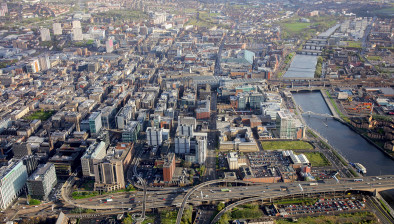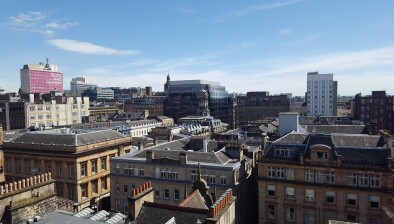Glasgow ‘faces £66m bill’ for refugee housing crisis

Council leader Susan Aitken
The leader of Glasgow City Council has called for urgent support from the Home Office as new figures revealed the city could be forced to spend up to £66 million on refugee housing next year.
The forecasts, which will be presented to councillors this week, highlight the growing strain on the city’s homelessness services.
At present, 44% of people presenting as homeless in Glasgow come from refugee households. Refugee families also make up more than half of all temporary accommodation placements, and over 60% of children in such housing.
Council leader Susan Aitken said the problem stemmed from UK asylum policy, which she described as “a machine that creates homeless refugees”.
Asylum seekers are initially housed by the Home Office in hotels or hostels before moving into dispersal accommodation while their claims are assessed. But when applications are approved, this support ends. Refugees then have 56 days to leave Home Office housing and secure their own accommodation.
Many cannot find housing in time, leaving Glasgow City Council to step in.
The situation is intensified by Scotland’s broader homelessness laws. Unlike in England, where support is restricted to households in “priority need”, in Scotland all unintentionally homeless people are entitled to permanent housing.
This difference has turned Glasgow into a magnet for new refugees, including many who were granted leave to remain elsewhere in the UK.
Around 12.4% of homelessness applications in Glasgow now come from people recognised as refugees outside Scotland. Officials estimate that by 2025/26, almost half of all such cases could involve people given asylum decisions in cities like London, Belfast, Birmingham, Manchester and Liverpool.
Each refugee household typically requires expensive temporary accommodation. A single B&B placement costs around £30,000 per year, while a temporary furnished flat costs about £9,000.
Glasgow’s shelters and housing stock are already under intense pressure, and move-on options are limited.
The council’s latest accounts show homelessness services overspent by £27m in 2024/25, with £12.4m taken from reserves. Net costs to the council were £14.6m.
Projections warn this could rise to £43m in 2025/26 and then £66m in 2026/27, unless policies change. Officials suggest that pausing dispersals to Glasgow and stopping requirements to house refugees from outside Scotland could reduce projected costs to £36m next year and just £13m by 2026/27.
Writing in The Herald, Cllr Aitken accused the UK Government of creating the problem and then leaving councils to deal with the fallout.
“The asylum system has become a machine that creates homeless refugees, with the government then washing its hands,” she wrote, adding that both the Conservatives and Labour were “paralysed by fear of Nigel Farage.”
Her intervention comes amid heightened tensions over asylum housing. In Falkirk at the weekend, protests outside a hotel used to house asylum seekers descended into clashes between anti-immigration campaigners and anti-racism demonstrators.
Cllr Aitken stressed that refugees themselves are not to blame.
“Like many Glaswegians, I am proud of our city’s record in supporting refugees. Migration has enhanced Glasgow’s 850-year story,” she said. “But the support from Whitehall must change. The UK’s duty to provide refuge is too important to be neglected any longer.”
Cllr Aitken is urging the Home Office to provide support to refugees immediately after they are granted leave to remain; expand homelessness services across England, Wales and Northern Ireland; increase funding for housebuilding and acquisitions in high-pressure areas; and deliver on the 2022 pledge to expand dispersal accommodation across Scotland.
According to a recent House of Commons briefing, Glasgow remains the UK’s largest host of asylum seekers, with 4,023 people housed in the city – the equivalent of 65 per 10,000 residents.







